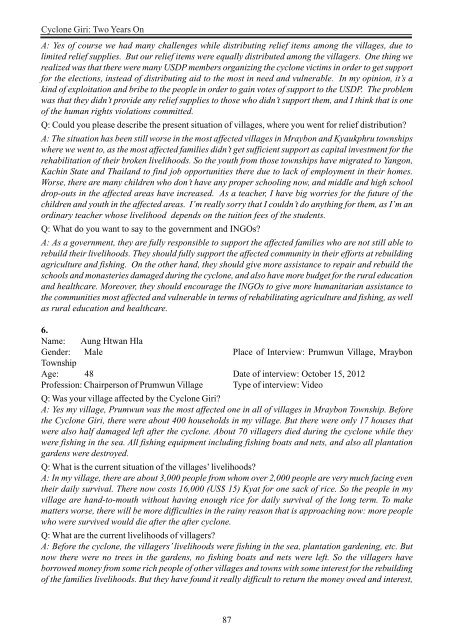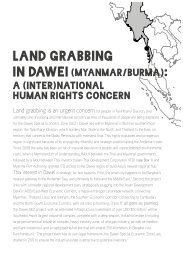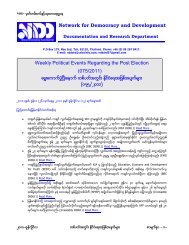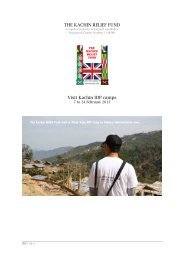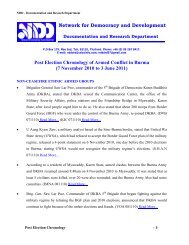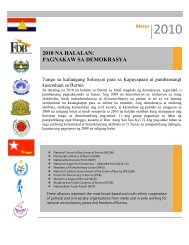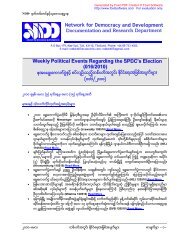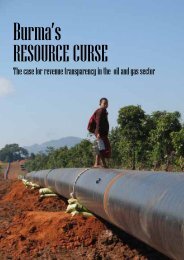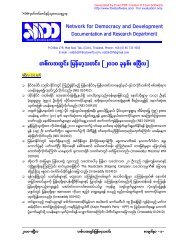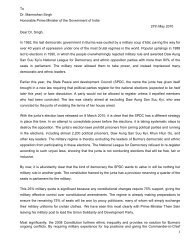Cyclone Giri - Two Years On - Burma Action Ireland
Cyclone Giri - Two Years On - Burma Action Ireland
Cyclone Giri - Two Years On - Burma Action Ireland
You also want an ePaper? Increase the reach of your titles
YUMPU automatically turns print PDFs into web optimized ePapers that Google loves.
<strong>Cyclone</strong> <strong>Giri</strong>: <strong>Two</strong> <strong>Years</strong> <strong>On</strong><br />
A: Yes of course we had many challenges while distributing relief items among the villages, due to<br />
limited relief supplies. But our relief items were equally distributed among the villagers. <strong>On</strong>e thing we<br />
realized was that there were many USDP members organizing the cyclone victims in order to get support<br />
for the elections, instead of distributing aid to the most in need and vulnerable. In my opinion, it’s a<br />
kind of exploitation and bribe to the people in order to gain votes of support to the USDP. The problem<br />
was that they didn’t provide any relief supplies to those who didn’t support them, and I think that is one<br />
of the human rights violations committed.<br />
Q: Could you please describe the present situation of villages, where you went for relief distribution<br />
A: The situation has been still worse in the most affected villages in Mraybon and Kyaukphru townships<br />
where we went to, as the most affected families didn’t get sufficient support as capital investment for the<br />
rehabilitation of their broken livelihoods. So the youth from those townships have migrated to Yangon,<br />
Kachin State and Thailand to find job opportunities there due to lack of employment in their homes.<br />
Worse, there are many children who don’t have any proper schooling now, and middle and high school<br />
drop-outs in the affected areas have increased. As a teacher, I have big worries for the future of the<br />
children and youth in the affected areas. I’m really sorry that I couldn’t do anything for them, as I’m an<br />
ordinary teacher whose livelihood depends on the tuition fees of the students.<br />
Q: What do you want to say to the government and INGOs<br />
A: As a government, they are fully responsible to support the affected families who are not still able to<br />
rebuild their livelihoods. They should fully support the affected community in their efforts at rebuilding<br />
agriculture and fishing. <strong>On</strong> the other hand, they should give more assistance to repair and rebuild the<br />
schools and monasteries damaged during the cyclone, and also have more budget for the rural education<br />
and healthcare. Moreover, they should encourage the INGOs to give more humanitarian assistance to<br />
the communities most affected and vulnerable in terms of rehabilitating agriculture and fishing, as well<br />
as rural education and healthcare.<br />
6.<br />
Name: Aung Htwan Hla<br />
Gender: Male Place of Interview: Prumwun Village, Mraybon<br />
Township<br />
Age: 48 Date of interview: October 15, 2012<br />
Profession: Chairperson of Prumwun Village Type of interview: Video<br />
Q: Was your village affected by the <strong>Cyclone</strong> <strong>Giri</strong><br />
A: Yes my village, Prumwun was the most affected one in all of villages in Mraybon Township. Before<br />
the <strong>Cyclone</strong> <strong>Giri</strong>, there were about 400 households in my village. But there were only 17 houses that<br />
were also half damaged left after the cyclone. About 70 villagers died during the cyclone while they<br />
were fishing in the sea. All fishing equipment including fishing boats and nets, and also all plantation<br />
gardens were destroyed.<br />
Q: What is the current situation of the villages’ livelihoods<br />
A: In my village, there are about 3,000 people from whom over 2,000 people are very much facing even<br />
their daily survival. There now costs 16,000 (US$ 15) Kyat for one sack of rice. So the people in my<br />
village are hand-to-mouth without having enough rice for daily survival of the long term. To make<br />
matters worse, there will be more difficulties in the rainy reason that is approaching now: more people<br />
who were survived would die after the after cyclone.<br />
Q: What are the current livelihoods of villagers<br />
A: Before the cyclone, the villagers’ livelihoods were fishing in the sea, plantation gardening, etc. But<br />
now there were no trees in the gardens, no fishing boats and nets were left. So the villagers have<br />
borrowed money from some rich people of other villages and towns with some interest for the rebuilding<br />
of the families livelihoods. But they have found it really difficult to return the money owed and interest,<br />
87


